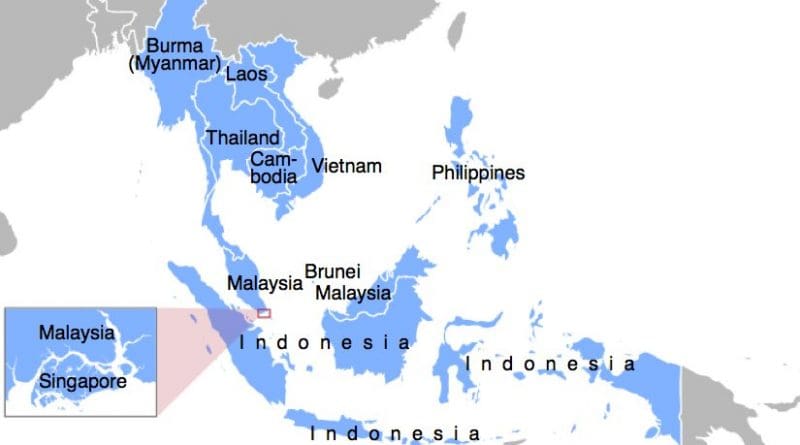ASEAN Fails To Address China, But Moves Closer To Addressing Piracy On South China Sea – Analysis
By David Wolfe*
As the 30th ASEAN Summit in Manila, Philippines came to a close, the primary questions regarding maritime security, terrorism, human trafficking ended with consensus, with one glaring omission. The word China does appear in any of the statements by either the Chairman’s final remarks of the conference, nor any remarks by the host, Philippine President Rodrigo Rao Duterte.
Additionally, President Duterte did not mention the Permanent Court of Arbitration ruling that favored the Philippines’ maritime claims over the West Philippine Sea and invalidating China’s nine-dash line claiming most of the disputed waters, because it was an issue between Manila and Beijing only.
This omission appeared to be a clear victory for China who lobbied for omission of any statement making reference to the victory or the United Nations ‘The Law of the Sea’. With the recent statements by President Duterte that China has threatened the Philippines with the potential of war regarding the arbitration decision, China does appear to be flexing its muscle. However, the consensus and unity in the statement regarding the issues that were addressed, does reflect a regional body with the potential to reclaim those rights, as well as collectively addressing far more pressing issues in future meetings.
Rather than expose areas of division among the group, the final statement address’ complex regional issues with regards to maritime rights, human trafficking and terrorism. Moreover, the statement addresses broader issues regarding the trade of illicit weapons, WMD’s and cooperation among states for enforcement. The final list of issues pertains more to the Chinese than regional states, as China is the largest regional arms dealer to regimes like North Korea and other despots. Without showing consensus and agreement on the security issues, the region body will have a more challenging time in their collective ability to push back against the Chinese aggression in the region. What’s more, this will show signs of a region finally taking responsibility and serving as a partner to the United States, rather than reliance on the United States Navy to serve as de facto police of the seas.
Historically, the security questions complicated the relationship between states, particularly with the disputes regarding the Spratley and Parcel Islands. There are various policy positions that require greater discussion in order to avoid conflicts between states in the area. However, states are at least finding common ground on the key issues of piracy and armed robbery at sea. By finding agreement on how to address this issue, ASEAN will show it has the potential to put to rest outstanding maritime issues.
Regional security questions regarding piracy and armed robbery of vessels in the region continues to disrupt supply chains, fishing vessels and the maritime transfer of commerce in the region. The security risks involving piracy and armed robbery led to the creation of The Regional Cooperation Agreement on Combating Piracy and Armed Robbery against Ships in Asia (ReCAAP), as well as the establishment of the Information Sharing Centre (ISC), which gives regional maritime security units to communicate and coordinate with one another. According to independent data gathered by the International Maritime Bureau (IMB) in Kuala Lumpur, Southeast Asia in general is now witnessing an uptick in incidents of piracy and armed robbery. By establishing a coordinated effort, regional bodies are laying the ground to govern and establish agreed upon regional policies regarding maritime rights and security. In order to adequately address this ongoing menace will require creative ideas to keep criminal elements off guard, and potentially disrupt their operation, rather the other way around.
The Daniel K. Inouye Asia Pacific Center for Security Studies (APCSS) recently stated in their report titled ‘The Indo-Asia-Pacific’s Maritime Future: A Practical Assessment of the State of Asian Seas’ that Governing bodies such as ASEAN do have the potential to alleviate these issues through greater law enforcement bodies in the region. One policy suggestion is to embed Coast Guard officers on regional law enforcement vessels travelling in international waters for snap inspections. This would strengthen the ability to combat the trade of illicit materials, human trafficking and illegal fishing. Additionally, it will give confidence to maritime insurance providers who continue to have concerns regarding the risk of being disrupted by armed robbery and pirates.
Of course, all of this remains to be seen, but the potential is ripe for the region to live up to its potential. Given the policy shifts that the Trump Administration recently have forced regional bodies to attempt to fill the vacuum left by the lack of US presence. Additionally, since there is increased interest by the Private Equity community, this can lead to greater economic investment. By reducing the risk of piracy and illicit crime, this will reduce the insurance burden as well as bringing together a region ready to finally come to life. Until insurance rates for vessels are stabilized, it will serve as an impediment to greater activity in the region. With the establishment of monitoring organizations such as ReCAAP and ISC, the potential is there. Hopefully the collaborative approach by regional states will lead to greater cooperation, and safer seas.
*David Wolfe is a specialist on Asian Security and private consultant for foundations, development firms and corporations specializing in human security, supply chain management and intellectual capacity building in emerging markets in Indo-Asia-Pac countries. He has previously written for the Denmark based Riskline, the Foreign Policy Journal and Tokyo based Ai-Eye Magazine. Mr. Wolfe holds an MAIPS from the Middlebury Institute of International Studies and is the former Government Relations Director for the Kashmiri American Council.

